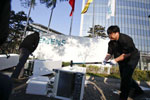Long-term support needed
Updated: 2011-12-07 08:00
(China Daily)
|
|||||||||||
EVEN THOUGH THE CONFERENCE ON AFGHANISTAN held in Bonn, Germany on Monday did succeed in securing international commitments on long-term support for the Asian country, uncertainties abound and may hinder the international community's efforts to deliver on their promises.
The Bonn conference was aimed at outlining a stable future for the country and addressing the transfer of security responsibilities to Afghan forces after the drawdown of NATO combat forces.
The gathering of more than 100 nations and international organizations has achieved a symbolic result in shoring up the political will of the international community to support the war-torn country in the long run.
However, according to a World Bank study released last month, Afghanistan may need around $7 billion a year from the international community to help pay its security and other bills after foreign troops leave.
Given that the United States and its European allies are being battered by their own economic woes, there is no guarantee that they will be willing or able to shoulder their responsibilities when it comes to discussing the details of international aid next year.
There is also no guarantee that the complicated and worsening relations between the US and a few key players in the region can be brought back on track so as to pave the way for more concerted international efforts to secure a better future for Afghanistan.
US-Pakistan ties were dealt a severe blow by the NATO friendly fire incident last month, in which 24 Pakistani troops were killed. In response, Pakistan ordered the US to vacate a military base and boycotted the Bonn meeting.
The absence of Islamabad, an influential neighbor of Kabul and a key player in the region, has cast doubts on the effectiveness of any commitments reached in Bonn.
Meanwhile, tension between the US and Iran, another important neighbor of Afghanistan, continues to escalate after last month's report by the International Atomic Energy Agency, which claims the Islamic country may still be conducting research aimed at producing nuclear weapons capability.
The diplomatic war between Iran and Western powers, ignited by Iranian protesters' storming into British diplomatic compounds in Teheran on Nov 29, has prompted Washington and its European allies to impose new sanctions against Teheran.
If not defused at an early date, all these tensions will countercheck the international community's will to continue to meet its responsibilities and honor its commitments to Afghanistan.
As the one wielding the most influence in the Asian country, the US needs to rethink its strategy in the region and ensure that it does not leave behind a big mess for the Afghan government to clear up.
To achieve "Afghan-led and Afghan-owned" reconstruction, the United Nations should play a leading role in coordinating international assistance to Afghanistan, and the Shanghai Cooperation Organization and other international organizations and cooperation mechanisms should be brought into full play too.
(China Daily 12/07/2011 page8)




